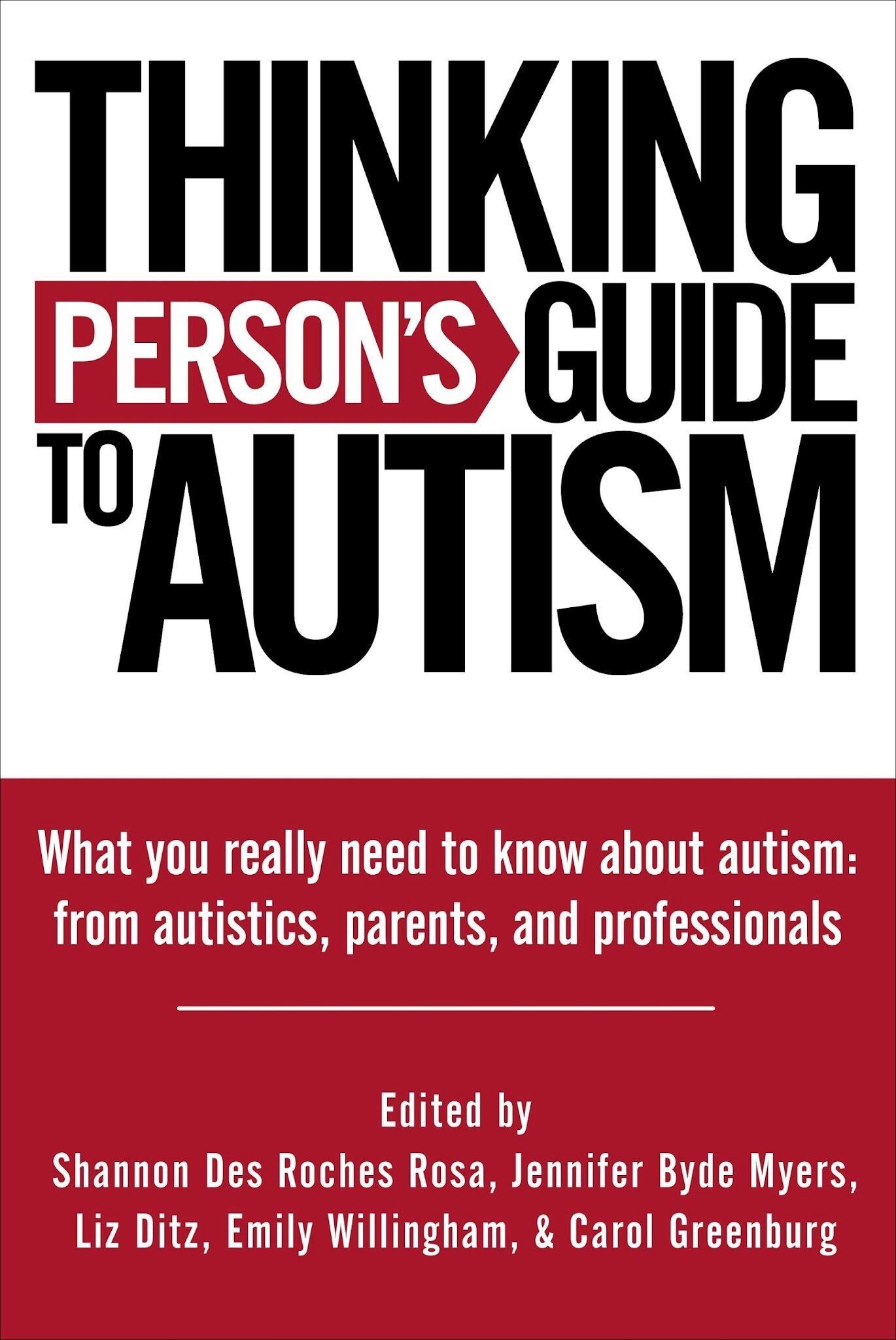Photo © Bobby Wade/Flickr [image: White woman with long brown hair and glasses, giving a presentation at a TEDx autism conference.] Our editors Carol and Shannon are spending the latter half of this week at IMFAR, the International Meeting for Autism Research, which is May 11 – 14 in Baltimore, MD. If you’re going, say hi! You can also follow us on Twitter at @ThinkingAutism, @ShannonRosa, and (Carol) @AspieAdvocate. IMFAR has improved a lot: We are glad to see the annual conference welcome increasing numbers of autistic speakers and attendees, so that autism researchers can listen to the people whose lives they are studying (and ideally trying to benefit), and vice versa. But since our editorial roles include being autism research ethics gadflies, we have to note that IMFAR is still mostly about the medical model view of autism and disability (curing and fixing), rather than the social view (understanding…
Tag: Carol Greenburg
Shannon Des Roches Rosa, with Carol Greenburg, Patricia George, and Christine Langager The disability and empowerment-themed website The Mighty recently published a post called Introducing: Meltdown Bingo, and sparked an actual Internet meltdown. In the post (since retracted by The Mighty’s editors), a parent used the popular Bingo Card meme to detail challenging aspects of their autistic child’s meltdowns. The online backlash from autistic and disability activists was understandably swift and strong, underpinned by a history of those activists’ dissatisfaction with The Mighty coupled with dismay over yet another hijacking of autistic children’s most vulnerable and misunderstood moments justified as parenting “honesty.” But here’s the thing most backlash commentary missed or ignored: The mother who wrote the post is autistic. Anyone who clicked on the author bio for the original Meltdown Bingo post would have read the following: “Christine is an adult-diagnosed autistic mother to autistic Cameron, 8.” Also missing…
One week ago, TPGA editors Shannon Des Roches Rosa, Jennifer Byde Myers, Emily Willingham, and Carol Greenburg spoke as a group at the University of San Francisco’s Developmental Disabilities Conference. It was an honor and a privilege to talk with a group of (mostly) professionals about how we use the power of social media to support our principles and TPGA’s mission, including autism acceptance and civil rights for people with disabilities, evidence-based approaches to autism supports and research, and debunking autism myths and misinformation. TPGA editrixes, post-UCSF session Shannon, who opened the discussion, is TPGA’s senior editor, and the parent of an autistic child. Thinking Person’s Guide to Autism (TPGA) is a book, a blog, and a community. We aim to support autistic people and their families, counter negative media messages and autism stigma, and provide positive autism attitude role models. We created TPGA in 2010 to be the resource…
Jennifer Byde Myers jennyalice.com We want April — Autism Acceptance Month — to matter, to help further acceptance and understanding of autistic experiences, happiness, and rights for autistic people of all ages and abilities. We will be publishing Autism Acceptance posts and pictures all month long. -TPGA Editors When we first started Thinking Person’s Guide to Autism (TPGA), our goal was to put, all in one place, the best information from autistics, parents of autistic children, and the professionals who serve our communities. We always felt it was key to deliver this information with frankness and with honesty, especially regarding autistic struggles, and challenges with aspects of education and parenting. We did not want to seek pity, or place blame. Instead, we sought to highlight neurodiversity as part of the fabric of humanity, part of what it means to be human. We wanted to present a variety of perspectives about…
2012 was an eventful year at Thinking Person’s Guide to Autism: Our book drew much acclaim, three new editors joined our team, we featured more than 30 profiles of Autistic kids and adults for April’s Slice of Life series, we went to the International Meeting for Autism Research in Toronto, our Facebook community hit and surpassed 10,000 members while remaining a nexus for thoughtful autism news and conversation, and we were cited and our editors were interviewed frequently — especially whenever autism made headlines. We also continued to publish thought-provoking and educational essays and interviews on this site, and all enjoyed and learned from the ensuing discussions. The 15 TPGA posts (with excerpts) below were 2012’s most popular — meaning hotly debated and/or praised — and give a sense of what we in the Thinking Person’s Guide to Autism community had on our minds these past twelve months. Thank you…
On Chanukah accommodations: “All those candles A had carefully placed and lit, he blew them out. Technically that’s a no-no in Jewish rituals. But we march to the beat of our own little yiddishe drummer boy around here, and eternal or not a flame is still a flame.”
Hurricane Sandy disrupted so many lives and displaced so many people in our autism, disability, and special ed communities. Many of those affected are still struggling to bring routine, safety, and necessities back into their lives — and not all who need assistance are getting the support they need. Here are two personal accounts about what’s not working right now in Sandy’s aftermath, what needs to change, and — for those who want to help — how it’s so much more important to donate money than goods. Carol Greenburg aspieadvocate-ascd.blogspot.com I am the autistic mother of an autistic 10-year-old. I want to share something that happened in the aftermath of Hurricane Sandy. My son, who has not had school or therapy for a week and is disconsolate over the disruption of his routine, finally had some therapy scheduled for this morning. Public transit is not yet well restored enough in…
Were you affected by Hurricane Sandy? How are you doing? If you were not affected personally, do you know someone who was? If they are autistic, have you checked in on them? Do you know of additional ways for non-locals to help out besides donating to the Red Cross? Update 11/3: The sites Sailing Autistic Seas and Love That Max have put together lists of resources for our communities, please share widely (some are family-focused, others are all-ages, if you know of anything they’ve missed, please let them or us know. -SR) Sailing Autistic Seas: Hurricane Sandy Resources Love That Max: Disaster Relief for Families of Kids With Special Needs Here are three on-the-ground reports from autistics and autism families. If you know of other stories or want to add your own, please do so in the comments. Carol Greenburg @AspieAdvocate tweeted her traumatizing but necessary trip into Manhattan from…
…One Unicorn at a Time. Carol Greenburg aspieadvocate-ascd.blogspot.com We Unicorns seldom have a chance to gather in the magical wild lands of Manhattan, but thanks to a press pass arranged by Sharon daVanport, president of Autism Women’s Network, I got to meet another of my species at a panel entitled Autistic and Female: They say That’s Rare and so Many Other Things at the Disability Studies in Education conference at Hunter College, on May 27: Dr. Elizabeth “Ibby” Grace. With a generous dollop of the whimsy autistic people are alleged to lack, Dr. Grace, an assistant Professor with the Diversity in Learning and Teaching Department and research methodologist at Louis University in Chicago, used her unicorn analogy to expose the myth behind the assumption that females with autism are rare. In fact, Dr. Grace maintains, autistic girls and women like her, and like me, are everywhere, but vastly under-identified and…
You are not alone. Many teens who receive an autism diagnosis feel broken, and suffer from pain of acceptance — even to the point of suicidal thoughts. And the resources you need are not easy to find. So we asked several adult autistics who were once autistic teens themselves: If you were in this headspace, how would you feel, what would you want people to say to you, what could possibly help? These are their replies. Karla Fisher I was angry the day I received my diagnosis. At first it just made me feel “broken.” People tried to tell me that I was the same person I was before. But those words did not make me feel better. Reaching “acceptance” of my label took me around eighteen months. There is very little written about this process that pertains to autistic people as our emotions do not neatly lineup in the…




